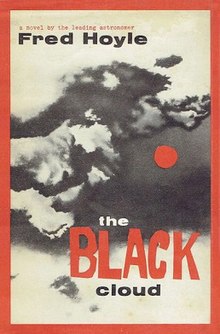

|
|
|
||
| Line 31: | Line 31: | ||
==Reception== |
==Reception== |
||
''[[The Spectator]]'' described it as "delightful and fascinating |
''[[The Spectator]]'' described it as "delightful and fascinating," despite the "slightly chilling" implication of Kingsley's attitude to the victims.<ref>{{cite news | magazine = [[The Spectator]] | page = 456 | date = 4 October 1957 | url = http://archive.spectator.co.uk/page/4th-october-1957/44 | title = New Novels | accessdate = 2014-03-17}}</ref> ''[[Galaxy Science Fiction|Galaxy]]'' reviewer Floyd C. Gale stated that he had not expected "such a noted cosmological theorist" as Hoyle to be a fiction writer but praised the novel "for the high quality of the narrative." Gale stated that "[w]ith the utmost of apparent ease, Hoyle writes a brand of humor that eludes the pens of pros", and hoped that he would "write more superior fictional ventures like this."<ref>"[https://archive.org/stream/galaxymagazine-1958-12/Galaxy_1958_12#page/n99/mode/2up Galaxy's 5 Star Shelf]", ''[[Galaxy Science Fiction]]'', December 1958, p.100</ref> [[Damon Knight]] described Hoyle's plotting as "masterly," saying the novel was "more elaborately convincing and a lot livelier than the usual gloom-laden treatment" in similar stories.<ref>"In the Balance". [[If (magazine)|''If'']]. December 1958, pp.109-10</ref> [[Richard Dawkins]] (writing in the 2010 [[Penguin Classics]] reissue) claimed the novel was "one of the greatest science fiction novels ever written."<ref>{{cite news | url = http://www.independent.co.uk/arts-entertainment/books/reviews/the-black-cloud-by-fred-hoyle-2136890.html | title = The Black Cloud, By Fred Hoyle | author = Brandon Robshaw | newspaper = [[The Independent]] | date = November 21, 2010 }}</ref> |
||
==Hoyle's scientific background== |
==Hoyle's scientific background== |
||

First edition cover
| |
| Author | Fred Hoyle |
|---|---|
| Cover artist | Desmond Skirrow |
| Language | English |
| Publisher | William Heinemann Ltd |
Publication date | 1957 |
| Media type | Print (book) |
| ISBN | 0-451-11432-9 |
The Black Cloud is a science fiction novel written by astrophysicist Sir Fred Hoyle. Published in 1957, the book details the arrival of an enormous cloud of gas that enters the solar system and appears about to destroy most of the life on Earth by blocking the Sun's radiation.
In 1964, astrophysicists on Earth become aware of an immense cloud of gas that is heading for the solar system. The cloud, if interposed between the Sun and the Earth, could wipe out most of the life on Earth by blocking solar radiation and ending photosynthesis. A cadre of astronomers and other scientists is drawn together in Nortonstowe, England, to study the cloud and report to the British government about the consequences of its presence.
The cloud unexpectedly decelerates as it approaches and comes to rest around the Sun, causing disastrous climatic changes on Earth and immense mortality and suffering for the human race. As the behaviour of the cloud proves to be impossible to predict scientifically, the team at Nortonstowe eventually come to the conclusion that it might be a life-form with a degree of intelligence. The scientists try to communicate with the cloud, and succeed. The cloud is revealed to be a superorganism, many times more intelligent than humans, which is surprised to find intelligent life-forms on a solid planet.
When the astronomers ask the cloud how its lifeform originated, it replies that they have always existed. One of the characters suggests this is incompatible with the Big Bang theory.
The cloud then learns that another intelligent cloud has stopped communicating and may have mysteriously vanished, not so far away in space in the cloud's terms, so it decides to move on, relieving Earth's suffering. Two of the scientists die in an attempt to learn some of the cloud's vast store of knowledge through visual signals, in order to gain further insights about the Universe.
The Spectator described it as "delightful and fascinating," despite the "slightly chilling" implication of Kingsley's attitude to the victims.[1] Galaxy reviewer Floyd C. Gale stated that he had not expected "such a noted cosmological theorist" as Hoyle to be a fiction writer but praised the novel "for the high quality of the narrative." Gale stated that "[w]ith the utmost of apparent ease, Hoyle writes a brand of humor that eludes the pens of pros", and hoped that he would "write more superior fictional ventures like this."[2] Damon Knight described Hoyle's plotting as "masterly," saying the novel was "more elaborately convincing and a lot livelier than the usual gloom-laden treatment" in similar stories.[3] Richard Dawkins (writing in the 2010 Penguin Classics reissue) claimed the novel was "one of the greatest science fiction novels ever written."[4]
Though the presence of a sentient cloud of gas may seem unlikely, the story is grounded in hard science.[5] The detection of the cloud is described using physics equations, all of which are included in the book. Hoyle brought his experience and knowledge as the Director of the Institute of Astronomy, Cambridge, a Fellow of the Royal Society into the book. Hoyle was also responsible for the term "Big Bang", though Hoyle himself did not believe the Big Bang theory. In a plot twist that would foreshadow Hoyle's stance on panspermia, the cloud expresses surprise that intelligent life is capable of forming on planets.